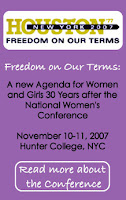This just came to me via the Council on Contemporary Families:
Programs that focus exclusively on abstinence have not been shown to affect teenage sexual behavior, although they are eligible for tens of millions of dollars in federal grants, according to a study released by a nonpartisan group that seeks to reduce teen pregnancies. The report is being released today by the nonpartisan National Campaign to Prevent Teen and Unplanned Pregnancy. A spending bill before Congress for the Department of Health and Human Services would provide $141 million in assistance for community-based, abstinence-only sex education programs, $4 million more than President Bush requested. The study – conducted by a senior research scientist at ETR Associates – says that while abstinence-only efforts appear to have little positive impact, more comprehensive sex-education programs were having “positive outcomes,†including teenagers “delaying the initiation of sex, reducing the frequency of sex, reducing the number of sexual partners and increasing condom or contraceptive use.†ETR Associates developed and markets several of the sex-education curricula reviewed in the report.
Come on kids. Are we surprised? Read more about it in this past Wednesday’s Arizona Daily Star.









